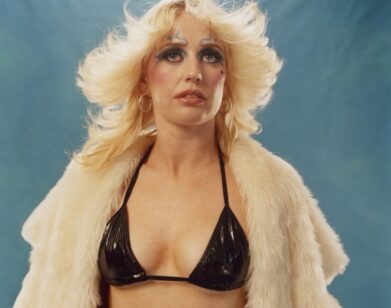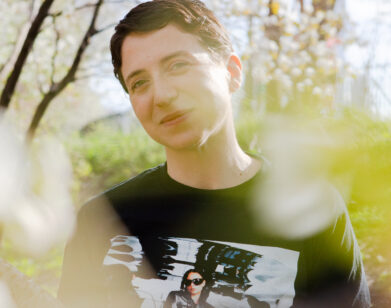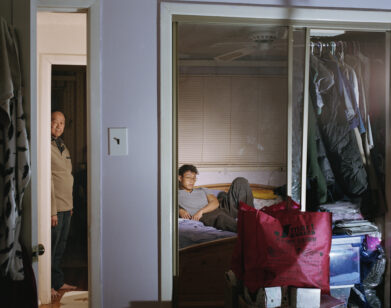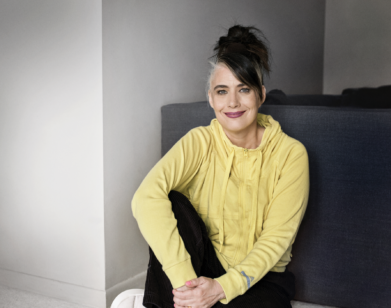LIT
Allie Rowbottom and Tea Hacic-Vlahovic Strip Down to Sell Books
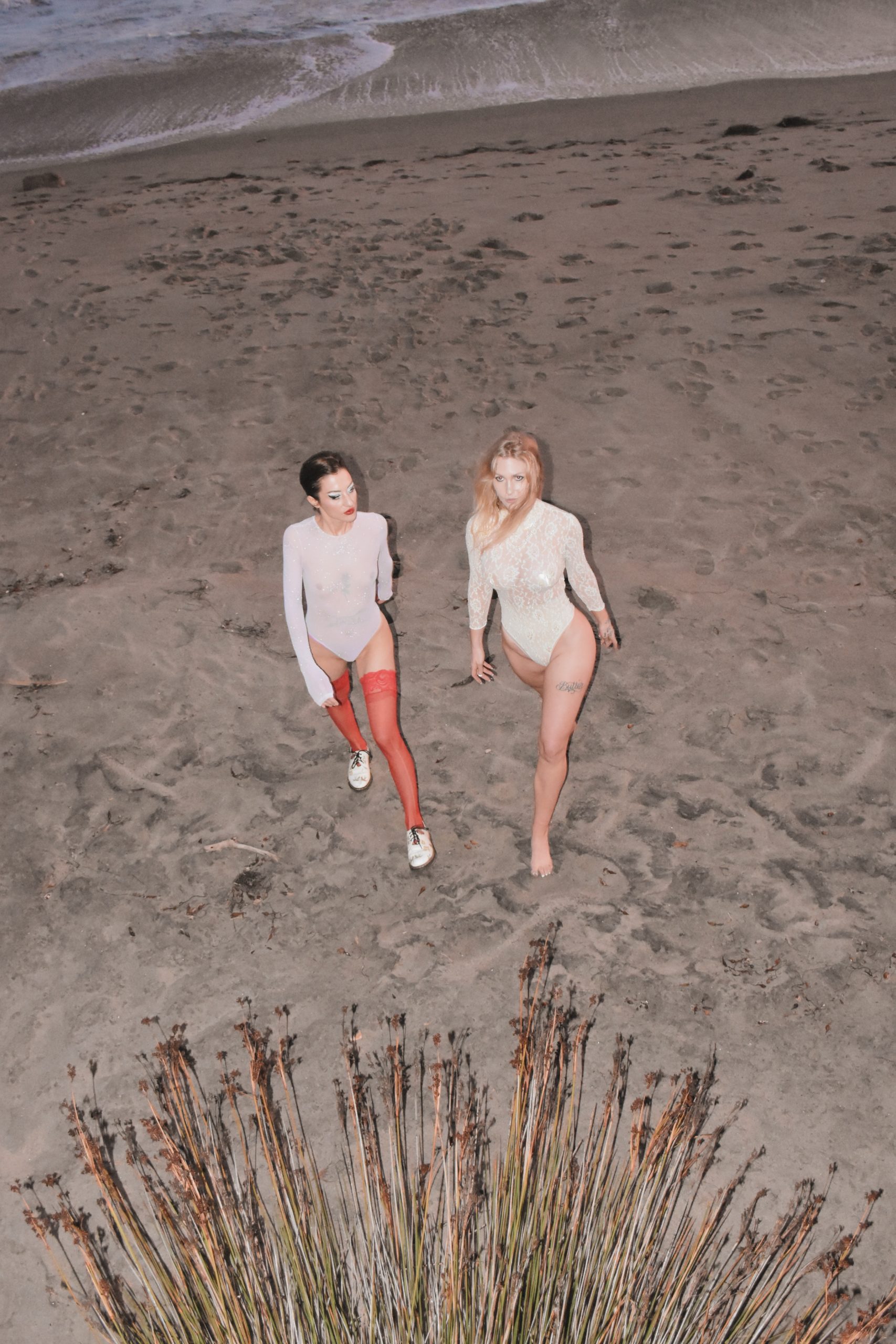
Not even writers are safe from the lure of self-promotion on social media, at least according to authors Allie Rowbottom and Tea Hacic-Vlahovic, who each recently published coming-of-age novels chronicling the noxious impact of internet culture on millennial adolescents. This fall, Rowbottom—who earned critical acclaim with her 2018 memoir Jell-O Girls: A Family History—is back with Aesthetica, a provocative debut novel about an Instagram celebrity who hopes to reverse her surgical and spiritual transformations. Hacic-Vlahovic also published her second book, a work of auto-fiction that chronicles the chaos and child-like desperation inherent in the North Carolina punk scene during the early days of blogging, aptly titled: A Cigarette Lit Backwards. Below, the writers link up to discuss their new books, the current state of the lit scene, and the problem with pandering to hyper-woke readers.
———
ALLIE ROWBOTTOM: Hi, Tea. What’s up?
TEA HACIC-VLAHOVIC: I’m having a terrible morning. My Instagram just got deactivated for the second time. I was telling my husband—I was like, “Maybe I can be free now. Maybe I can rebrand myself as a real writer.” But we don’t have that luxury, do we?
ROWBOTTOM: For a long time, my goal was to be able to get off social media and be like Ottessa Moshfegh or Emma Cline—someone who’s anonymous and it actually works in their favor. They got plucked by the establishment and don’t need to do what the rest of us do, which is shill constantly.
HACIC-VLAHOVIC: Dude, I only started writing books so that I don’t have to be an online person. And then, when I finally found a real publisher, what they liked most about me was that I have a big social media following. You’re trapped! And we have to do all of our own promotion, basically.
ROWBOTTOM: No shade to our dear publishers. But the reality is, it’s basically all on us. I feel the same way about being hot in general. From a young age, I was like, “I’m not going to be hot forever, so I better invest in a bedrock like intelligence or a literature degree.” And then come to find, with Instagram and everything, it’s not enough to just be smart and be a writer. You also have to find a way to market yourself.
HACIC-VLAHOVIC: I showed my mom the photos we took in Malibu and she was like, “You’re writers. You don’t need to be naked anymore.” I’m like, “Mom, as if. We need to be more naked now. We need to sell our books.” I wish that being a published author meant that you don’t need to post hole. [Laughs]
ROWBOTTOM: I feel like our publishers would be like, “You don’t need to do that.” It’s a personal choice, but for my first book, I took a very straight and narrow path. I did not take any risks in my self presentation. Everything I wore was super buttoned-up, super “take me seriously,” and nobody took me seriously anyway.
HACIC-VLAHOVIC: Also, your first book was non-fiction, Jell-O Girls. It was a heavy, depressing book about your family. Of course, presenting that, you had to be a little bit more buttoned -p. For this new one, Aesthetica, you’re probably going to have more fun promoting it, because it’s about a woman who got super famous online for being hot and filtered—she had all these surgeries. Do you want to tell the people what your idea is for your launch party in New York?
ROWBOTTOM: It’ll be a book launch party with readings and stuff, but I’m also getting someone to do Botox, which I think is a great way for this injector to get new clientele. I wanted to do something that’s sexy and fun. I get to self-objectify on my Instagram but be like, “It’s a performance of my novel.”
HACIC-VLAHOVIC: Exactly.
ROWBOTTOM: You just launched A Cigarette Lit Backwards, your second novel, and you just got back to L.A. after doing parties and readings in New York. What’s it like to promote a book across a couple different cities?
HACIC-VLAHOVIC: I had an L.A. launch party and a New York launch party. The L.A. launch party was on the rooftop of a hotel. The New York launch party was in a basement. For the L.A. party, I hired this punk rock DJ, but he ended up playing too much pop. The punk rock DJ I hired in New York ended up playing insane obscure noise. I had to beg him to play Blink-182. He went way too hardcore. And then at the L.A. party, people were like, “I’ll have a sugar-free Red Bull or maybe a Coors Light.” In New York, everyone was like, “Give me a double whiskey. Give me a crack pipe.” It was very representative of the difference between the two cities. Boring heaven, fun hell.
ROWBOTTOM: Right.
HACIC-VLAHOVIC: I wanted my parties to feel punk since it’s a punk book. But I was just thinking about how performative the whole concept of a book tour is. I didn’t need to have these parties. I just ended up spending money. It was fun, sure, but that’s an old school way of promoting your books. I think all of us that grew up when magazines mattered more have this idea of what it means to be an author and that means touring with your book. Any excuse to party.
ROWBOTTOM: Having been to a couple of your book parties, they definitely differ from a conventional book tour.
HACIC-VLAHOVIC: You know I hate readings. I didn’t even read at my last bookstore launch. It’s so boring. I just think everything should be a party. I have a question for you.
ROWBOTTOM: Sure.
HACIC-VLAHOVIC: Do you ever feel like you’re selling people out when you’re writing about them? Or do you feel you’re saving their lives because they get to be immortal in your book?
ROWBOTTOM: The first book I wrote was non-fiction. I wrote about real people. It wasn’t a fun experience, but I felt like I had to write it. I could have been a lot harsher with all the men who felt burned by that book. With this one, it doesn’t feel like I’m doing anyone a favor per se, but I definitely don’t feel like I’m out to get anyone. Even when I’ve used things from my life experience to inform characters, they’re all pretty fabricated. What about you?
HACIC-VLAHOVIC: My first book was 98% true. I had a bad boyfriend and a bad boss, but I made them both look better than they really were. This second one, three of the characters are based on real people who are dead now. I wanted to preserve them. Even if your first boyfriends were jerk offs, they still deserve to have their little adolescent selves taken care of and appreciated by some random reader in Idaho. Writers, we’re all assholes, but I genuinely think I am doing a good thing. Whether or not that’s true—whatever. It’s my delusion and I believe it.
ROWBOTTOM: I posted your book on Instagram when I got the hard cover. Several girls DM-ed and were like, “Oh my god, I grew up in North Carolina. This book is such an accurate depiction of the punk scene.” Obviously I didn’t grow up in North Carolina, but I also felt very seen by this book.
HACIC-VLAHOVIC: The book is showing the end of an era when you still had to go out and fight in real life for who you wanted to be. You had to prove to yourself, to your peers, in person, that you were cool. But MySpace was already lurking around the corner. Your book shows the beginning of the Instagram era that I’m complaining about being trapped in right now. Your main character is one of the first influencers. Again, I hate Instagram, but I know I do have some power in having these followers. It’s like money now. What are you supposed to do? Run away from it?
ROWBOTTOM: Yeah.
HACIC-VLAHOVIC: Do you ever feel like you have to censor yourself or write in a certain way to either appease or stir up woke audiences or let publishers check off a certain box?
ROWBOTTOM: I have in the past. With this book, I really made a concerted effort not to do that. I was intoxicated by my own bravery, which is terrible. But when I finished the book and it was time to sell it, my choice not to moralize or pander to hyper-wokeness was a sticking point for a lot of editors who passed on the book. But I am glad that I didn’t cow to what I see as a trend in literary fiction towards an obvious hyper-moral takeaway. I think that that is really alienating for a new generation of readers. But I will also say, I see, especially in New York, a very obvious reactionary swing back towards conservatism. That’s lame.
HACIC-VLAHOVIC: Yeah. I’m like, why does it have to be one or the other? Why can’t you just be cool? In both of my books, there’s a lot of sex. Getting raped and assaulted, it’s just part of being a girl. I’m not saying it should be that way. It’s what happens. Some criticism I’ve gotten from editors and readers, with this one especially, is like, “We wish you had had more of a serious discussion about sexual assault. We wish you hadn’t just brushed it off.” And I’m like, but that’s what you have to do. A teenage girl living in North Carolina doesn’t get to make a whole “Me Too” movement about her gang bang. You have to move on. Because otherwise you don’t get to be friends with those guys anymore. Sometimes the people that abuse you are the ones you still need to be hanging around with. Your book is like a horror novel in a way, because it’s just showing how violent it is to be a woman. I don’t think we have to always be trying to come away with some point or some moral or some lesson. Sometimes you just want to show people what happens and let them come up with it.
ROWBOTTOM: I don’t think of fiction as a medium through which you tell someone what to make of the material you’ve just presented. There is a very expository, almost nonfiction tactic and editing style that’s really common in literary fiction right now. I was always taught not to over explain, in any writing, in any genre. I did not experience this with my novel now, but I think a lot of editors will put a little comment box and be like, “Can you just add three more sentences here really nailing in this point?”
HACIC-VLAHOVIC: Yeah, yeah, yeah.
ROWBOTTOM: I think there’s a prevailing narrative when you have a book coming out that you should just be grateful for everything that you’ve gotten and lucky to be published at all, but that’s bullshit and it can be really emotionally draining and honestly depressing just to let a book go. You’ve worked on it for so long and now it’s not yours anymore. How are you feeling?
HACIC-VLAHOVIC: I mean, I’ve been depressed for the past few months. You put all this time into writing it, you put all this time into getting it sold. And then, when it comes out, it’s just like any other day. You gotta let it go and move on to the next one. That’s all we can do, work on the next thing and hope our books get adapted to television. That’s where the money is.
ROWBOTTOM: We’re just starting to clue into that. How do you see A Cigarette Lit Backwards? Is it a movie or a miniseries?
HACIC-VLAHOVIC: I think it should be a movie.
ROWBOTTOM: I see that.
HACIC-VLAHOVIC: I’m working with this other guy now, but one woman who was thinking of representing it was almost through the book and she was like, “I love it, I love it, I love it.” And then she finished it and she was like, “I’m sorry, It’s actually way too bleak. I just don’t understand why Kat makes the choices she makes.” To me, A Cigarette Lit Backwards is like a fairy tale. It’s almost too nice.
ROWBOTTOM: I love how it ends on a hopeful note. I think that agent was very wrong. But normally, they are.
HACIC-VLAHOVIC: It’s funny when you think that you’re writing something positive that other people are like, “Oh my god, this is so hardcore.” It makes you realize just how cool you are, I guess.
ROWBOTTOM: I think that is a very smart way to see it, because you don’t want to write a book that everyone loves. You want to write a book that the right people love, and then everybody else feels confused by or enraged by. That’s a sign that you’re doing something positive.


